
— Sam Charlwood
Oversized and, after much ado, over here. For years, American automotive executives have been quizzed about the possibility of their evergreen pick-ups and SUVs making a play in Australia.
With the RAM 1500, Chevrolet Silverado, Ford F-150 and Toyota Tundra now firmly cemented in the Aussie new-car landscape, attention has swung to their SUV equivalents.
American manufacturer GMC – short for General Motors Company – is the first such manufacturer to roll the dice, with the aptly named GMC Yukon Denali.
With ladder frame origins and a mammoth eight-seat interior, the Denali offers segment-best towing, a brutish V8 petrol engine and luxury in spades.
But is it truly a good fit for Oz? Read on to find out.
The GMC Yukon Denali is available in a solitary grade in Australia, priced at a lofty $174,990 plus on-road costs.
At that money it comfortably outprices the eight-seat Nissan Patrol Warrior ($105,660 plus ORCs), Toyota LandCruiser 300 Series Sahara ZX ($146,910 plus ORCs) and most models within the Lexus LX range ($155,796 to $217,796 plus ORCs).
It’s also a tens of thousands of dollars dearer than the aforementioned American pick-up options – even topping the monstrous Chevrolet Silverado 2500 HD ($166,500 plus ORCs) on price.
For context, the hulking seven-seat BMW X7 starts around the same money ($171,300 plus on-road costs), but continues north as you climb through its model grades.
Produced in Arlington, Texas, the GMC is shipped to Melbourne and converted to right-hand drive at a specialised plant in Dandenong, alongside fellow GM models such as the Silverado.
The Denali starts from $123,000 (AUD) in its native US, where the Yukon has been on sale since 1992. At that price, it foregoes some equipment fitted standard here.
The GMC Yukon Denali wants for very little inside.
From the moment you open the driver’s door and the sidestep automatically deploys from underneath the sill, just about everything is electrically adjusted, heated, or both.
Soft-touch materials adorn all contact points, while storage is taken care of by umpteen open cubbies and compartments across the centre console, dashboard and door cards.
Practicality is assured with its bank of dedicated buttons and switchgear within the dashboard centre fascia, meaning you don’t always need to navigate the mammoth 16.8-inch screen for basic commands. The screen itself is legible, straightforward to navigate and responsive – ditto the matching digital instrument cluster and head-up displays.
Less practical (or distinguished) are the swathes of piano black trim. At launch, our fresh test cars were already showing evidence of wear, with scratches and fingerprints everywhere.
Small fit and finish items like this (plus a decidedly American design) mean the Denali’s definition of premium isn’t quite as distinguished as traditional European marques.
We also found the main chair a little out of sorts for your correspondent’s 176cm frame: it was as though my arms needed to be a couple of inches longer to get the best setting. That said, the driver’s seat can be stowed low enough in the cabin to cultivate maximum feeling and feedback.
There’s luxury in the GMC Yukon Denali’s size, too. Across all three rows of seating (2-3-3 to make eight individual pews), there’s a helpful spread of space, air vents and power outlets.
The second row offers wide door apertures and acres of leg, head and shoulder room, with the same airy glasshouse and soft-touch contact points.
The outbound chairs electrically tilt, fold and tumble at the press of a button, creating a generous passageway through to the bleachers. Here, there’s room for a couple of older kids or even adults: you could squeeze three across the third row at a pinch, and two in relative comfort.
The third row is also serviced by air vents and separate USB-C ports. It still offers ample outward vision courtesy of decent windows, though harder plastic touchpoints and the higher positioning of the floor means it still isn’t a space you’d want to spend longer journeys in.
The Denali offers tether points in the outboard second row and outboard third row chairs, adding up to four child seat options in total.
The boot space is broad and generous with its sizing too. With the third row up there’s space for overnight bags, but stow the second and third rows at the touch of a button and it liberates a flat floor space with room for a double mattress.
The boot opening is huge, with a separate option to open the rear glass of the tailgate (ala Toyota Prado) for handy access to top-level luggage on a trip away. Unlike the Prado, however, the glass section itself is quite narrow, limiting the functionality.
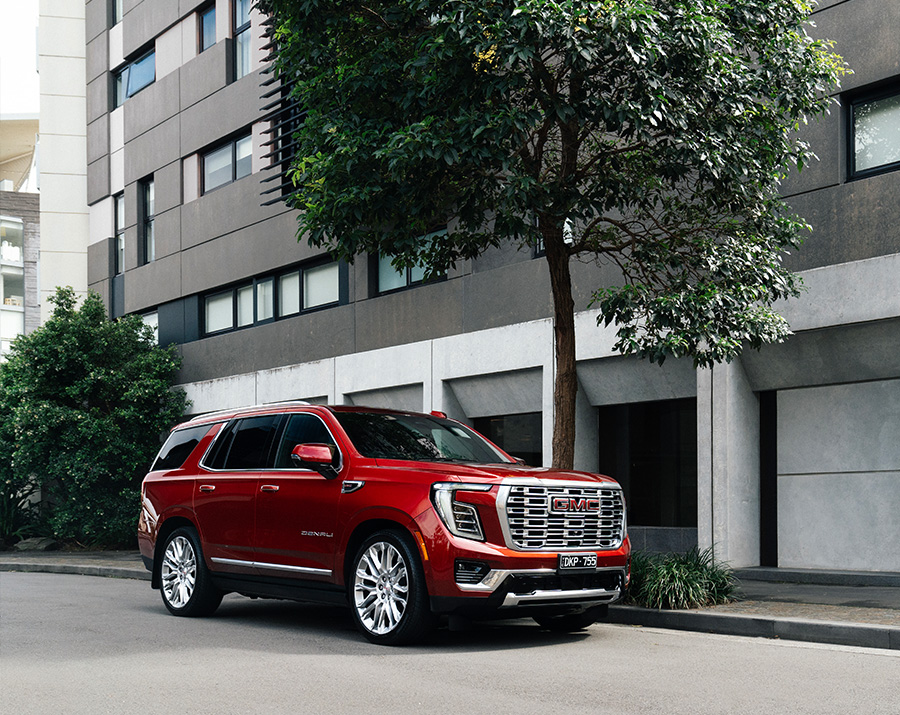
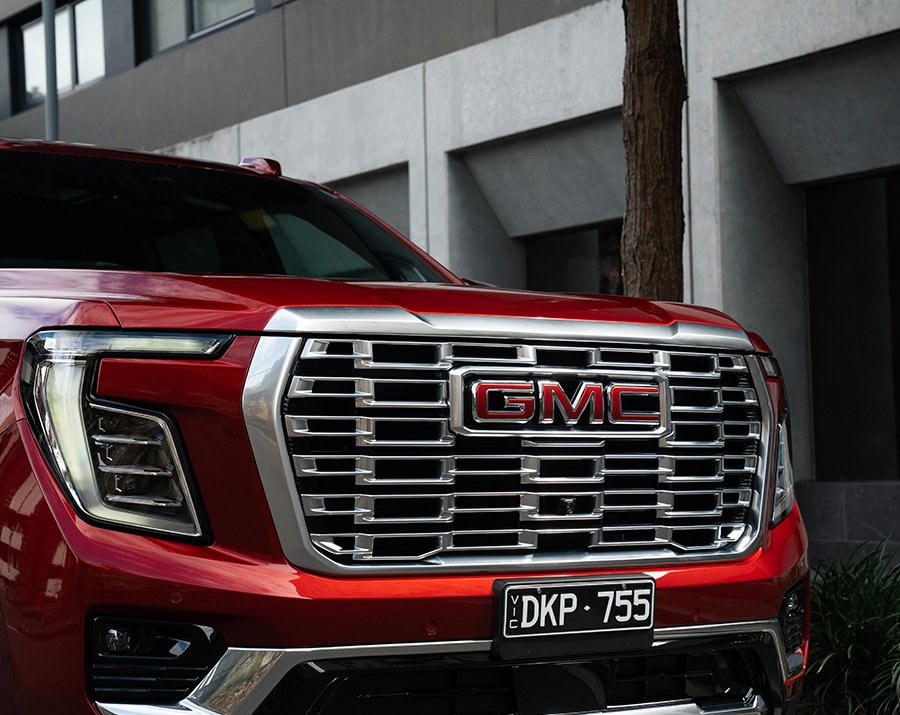
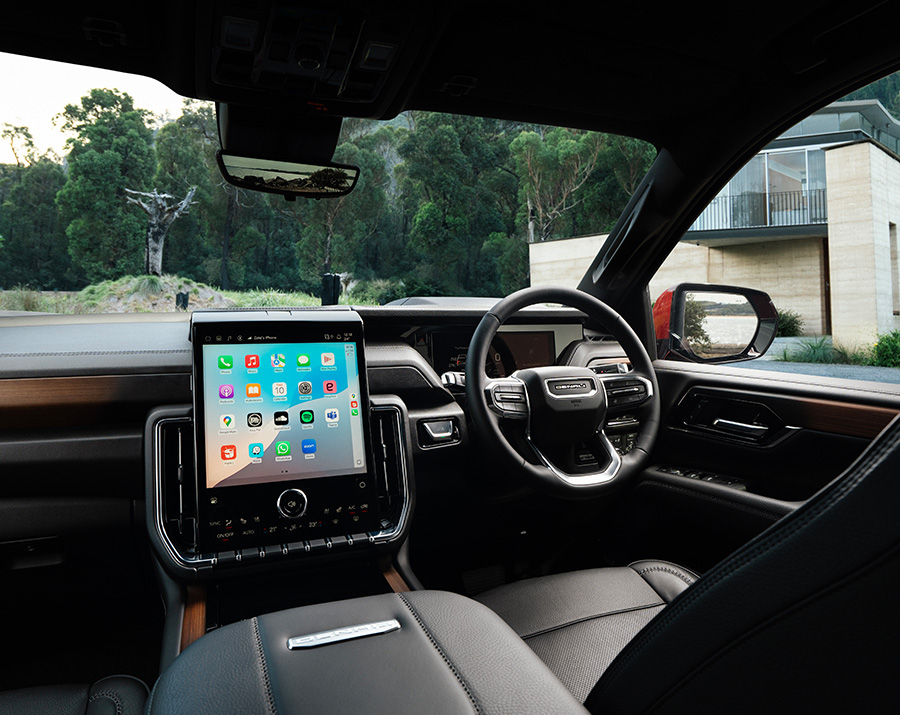


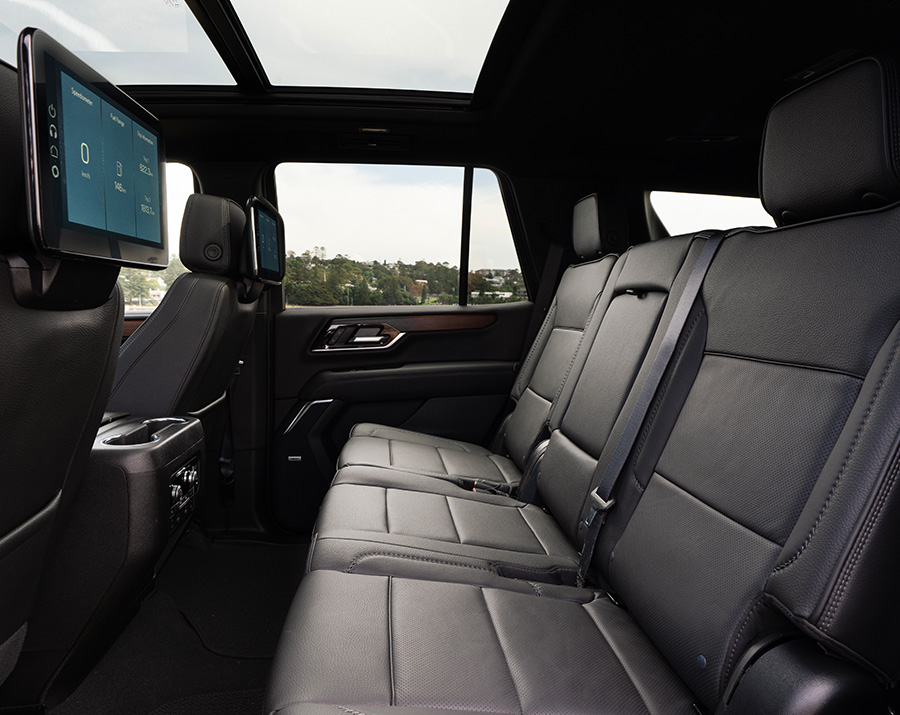
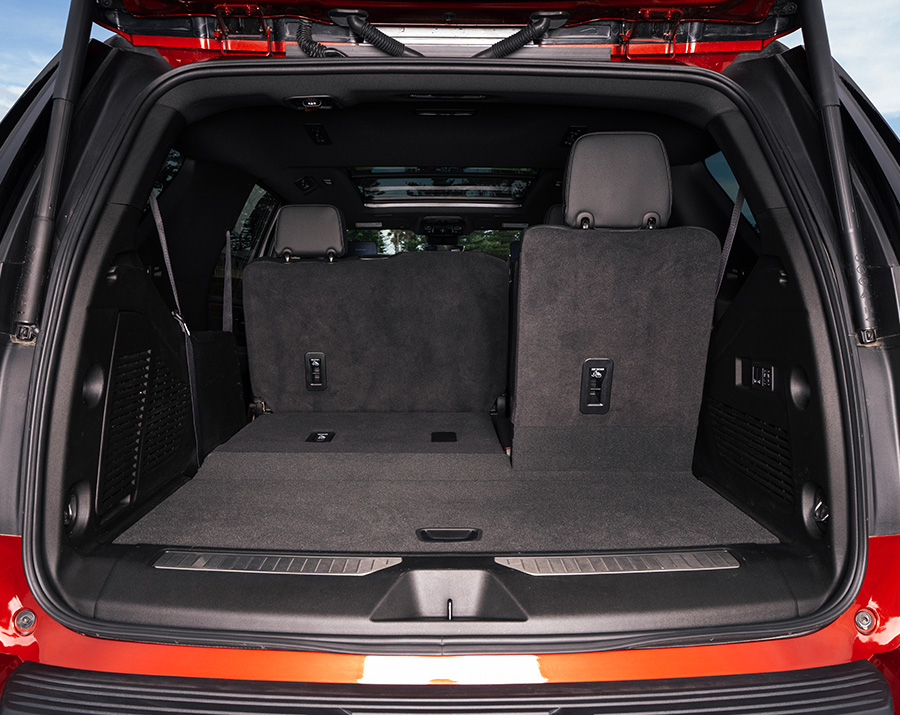
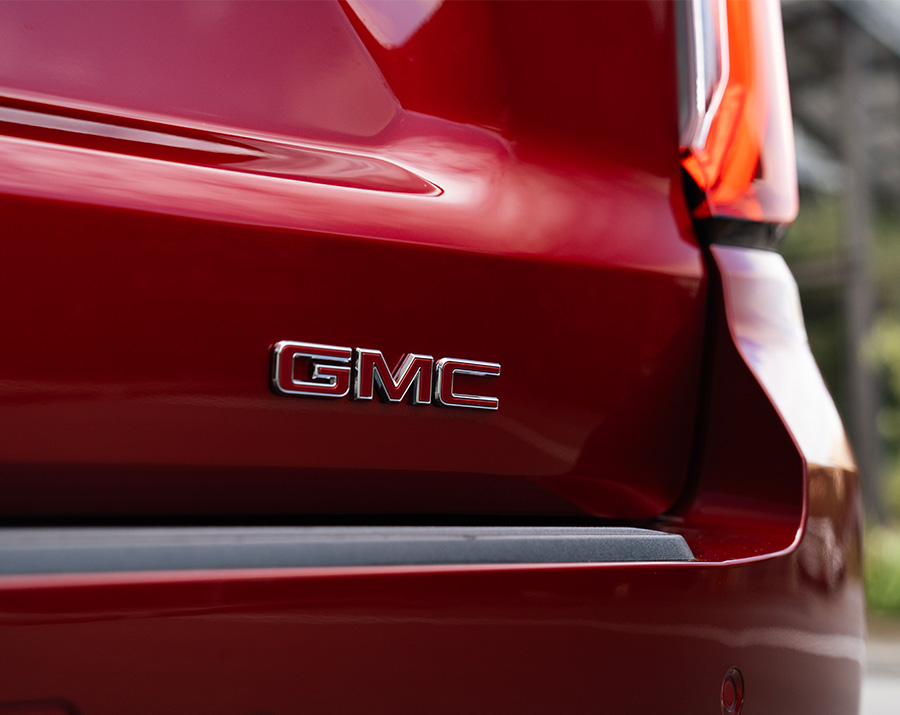
The GMC Yukon Denali is loaded to the gills with standard equipment – as it would want to be for the price.
Buyers get LED headlights and taillights, LED daytime running lights, gigantic 24-inch wheels (with a full-size steel spare), panoramic sunroof, keyless entry and start, powered tailgate, 12-way adjustable powered front seats with heating and cooling, heated steering wheel and heated rear seats – everything but the kitchen sink.
Infotainment is equally extensive, comprising a 16.8-inch centre touchscreen display with Apple CarPlay and Android Auto, a 14-speaker Bose audio system and wireless phone charging. It is matched by an 11-inch digital instrument cluster and a 15-inch colour head-up display.
Furthermore, in the second row you’ll find dual 12.6-inch LCD screens mounted behind the front seat headrests.
There are USB-C charging points handily dotted around all three rows of seating, while the driver has access to no fewer than 11 external cameras, including a reversing camera, tow ball camera, overhead camera and front-facing camera.
Very convenient. Less impressive are the Yukon’s Australian aftersales provisions: a three-year/100,000km warranty and slightly more frequent servicing intervals of 12,000km/12 months – whichever comes first.
Though the Denali hasn’t been tested locally by ANCAP, it reads as very safe on paper.
Among the standard inclusions: six airbags, autonomous emergency braking with intersection, pedestrian and cyclist detection, side cyclist alert, rear cross-traffic alert, lane keeping assistance with lane departure warning, rear seat reminder and trailer sway control.
Happily, the curtain airbags extend to the third row, according to GMSV, meaning rear occupants are protected in the event of a collision.
There’s also a digital rear view mirror and rear camera washer, just because.
The Denali draws power from a recognisable GM source. Under its lengthy bonnet lives a version of the carmaker’s prodigious 6.2-litre naturally-aspirated petrol V8 – which has powered the Denali in some capacity for more than 10 years.
In this trim, the V8 makes a hearty 313kW and 624Nm, sending drive via a 10-speed automatic and an electronic limited-slip differential. A two-speed transfer case offers a choice of rear-wheel drive, four-wheel drive high and four-wheel drive low settings, which means strong off-road credentials – though perhaps not while fitted with those 24-inch wheels and tyres.
The V8 claims a combined fuel consumption rating of 12.8L/100km and offers ‘dynamic fuel management’ (GM-speak for cylinder deactivation) as standard. A 91-litre fuel tank means a theoretical range of about 700km.
The Yukon rides on a ladder frame chassis and is fitted with magnetic ride control dampers, which combine with adaptive air suspension to stiffen or soften the ride depending on driving mode. Four-wheel disc brakes are fitted standard.
These points are quite handy since the Yukon offers an enormous towing rating. Officially, you can tow up to 3628kg braked – a new SUV benchmark in Australia, and a feat complemented by handy features including an integrated brake controller. The caveat is that you’ll need to use a 70mm tow ball and a weight distribution hitch to do so. But even then, the Yukon’s towing prowess is undeniable.
Unsurprisingly, the GMC Yukon Denali feels big from behind the wheel.
Settling into its broad, cosseting leather chairs, you’re initially struck by the wall of truck-like dashboard in front and the bonnet that accounts for quite a fraction of its 5.3-metre exterior length.
Upon setting off from Canberra during the national launch this month, the vehicle’s 2.3-metre width also become evident as we made way for the coast via the plunging Clyde Mountain and stunning Budawang National Park.
That said, light low speed steering and the Denali’s arsenal of different cameras do go some way to normalising the monstrous dimensions, while the V8 engine feels competent in all situations and well up to the task.
The 6.2-litre makes light work of regular conveyance, working with the 10-speed auto to effortlessly click through the ratios. Asking more of the V8 is a cinch, too: it simply leans on its rich torque reserves and bellows away from the engine bay as the Denali builds speed. This is the case right up to highway speeds, whereupon the tachometer rests at a miserly 1500rpm.
The Denali’s dynamism defied initial expectations during launch. We expected big, soft and cushy dynamics, but were relatively surprised with the level of control executed upon navigating its 2.8-tonne heft through a series of country roads.
There’s no excessive roll or pitch, the body feels taut on-road and the Denali swallows up larger bumps with aplomb.
The GMC stops and turns confidently on a ribboning section of mountain road, with its size and heft only really evident on tighter corners, where more speed needs to be washed off.
It’s not all rosy, however. Approximate steering – partially a symptom of sheer size and ladder frame origins – is less endearing, and then there’s the initial ride on those 24-inch wheels: high frequency bumps manage to constantly niggle their way through the cabin, while road noise on coarse-chip surfaces is ever-present.
These traits are forgivable on a sports car, but they are far less palatable on a luxury SUV. Especially one that costs as much as the Denali.
On a 250km drive mostly comprising open touring roads, we averaged 12.8L/100km – impressively matching the claim. No doubt this figure would balloon in urban settings.
We will reserve full judgement on the Denali’s towing credentials for a heavier and more thorough test. A short drive with a 2.0-tonne horse float in tow revealed decent stability and continued performance from the V8 engine.
The GMC Yukon Denali takes the SUV fascination to new heights (and lengths) in Australia.
It offers a visually striking point of difference from the regular upper large SUV set, while its eight-seat capacity, V8 petrol engine and 3.6-tonne towing are all worthy standalone features.
Beyond that, it’s hard to overlook the exorbitant price of entry and its size – unless towing and open road touring are regularly part of your travels.
What we liked
What could be better?